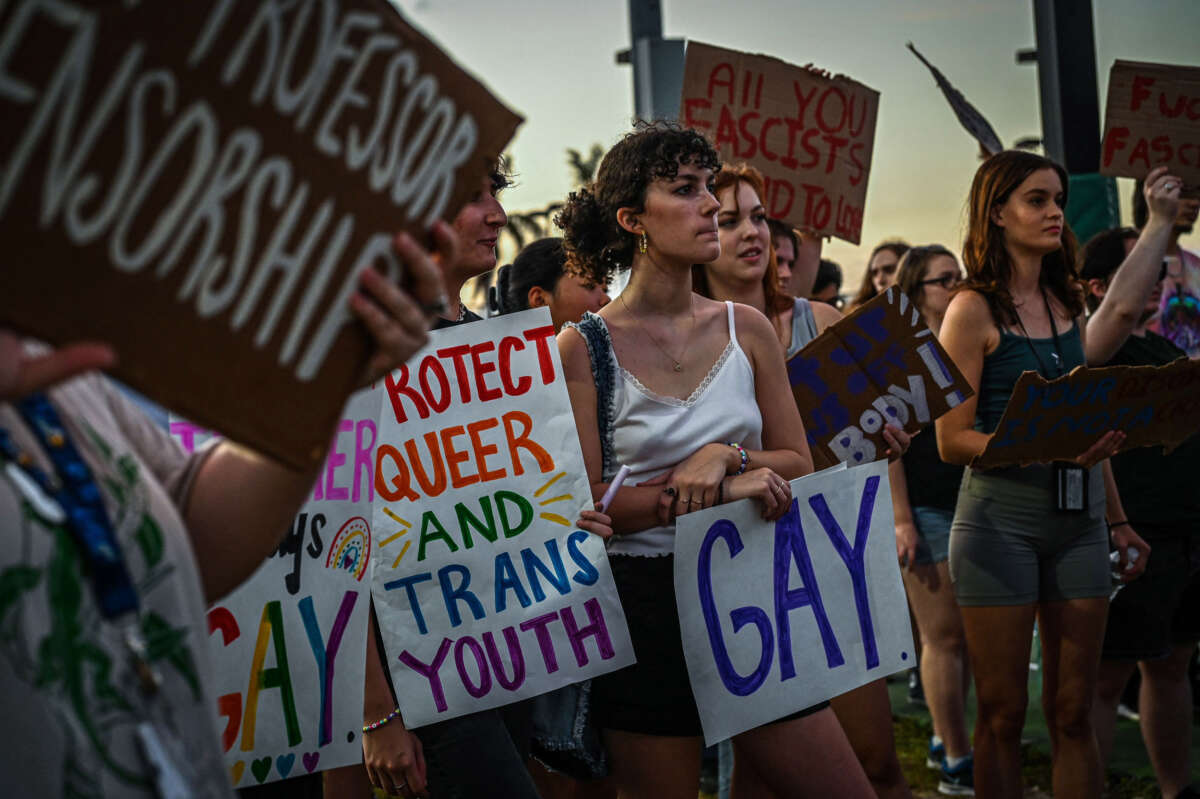Honest, paywall-free news is rare. Please support our boldly independent journalism with a donation of any size.
A key Republican lawmaker in Florida’s legislature is signaling that she would be open to implementing increased restrictions on what educators can discuss when it comes to LGBTQ issues in public school classrooms throughout the state.
The proposal would expand the “Parental Rights in Education Act” — commonly referred to as the “Don’t Say Gay” law — that was enacted this year by Gov. Ron DeSantis (R).
Earlier this month, Senate President Kathleen Passidomo (R) told reporters that members of her caucus believe current law should be amended to forbid teachers from having classroom discussions in late elementary and early middle school settings that include mention of any LGBTQ themes. The law as it’s written right now forbids such discussions in K-3 classrooms, and puts some restrictions — though not an outright ban — on discussions in grades 4 to 6.
Passidomo indicated that she’d be open to further curtailments.
“The one thing that I think could be looked at is, we ended it at grades one through three,” she said. “I don’t think I’d be supportive of [ending LGBTQ discussions in] high school, because kids in high school are hopefully a little bit more mature, at least they should be. But, you know, the middle school, maybe going to sixth grade or something like that.”
Passidomo elaborated on her comments, telling Jacksonville TV news station WJXT that she would “not be averse” to proposals by conservatives in the state legislature to bring forward a bill focused on limiting what grades 4 to 6 school teachers can discuss with their students.
Critics panned the idea as harmful to students who may be coming out in their late elementary or middle school years, or who otherwise may have questions about sexuality they want answered as they try to determine or understand their identities.
“To try to ostracize anyone because of gender identification is just wrong,” former state Sen. Audrey Gibson (D) said in response to Passidomo’s words.
Crystal Czyscon, youth director of Visuality, a state organization dedicated toward enhancing and sustaining the “health and well-being of the lesbian, gay, bisexual, transgender, queer plus communities,” also criticized the idea of expanding the “Don’t Say Gay” legislation.
“As we know, the 6th grade to 8th grade is usually the initial onset of puberty for many children, and it’s when children really recognize who they are and how they feel,” Czyscon said to WBBH, an NBC affiliate TV station in Fort Myers, Florida, adding that she is “really concerned for the State of Florida that we have this fascist authoritarian focus on one community.”
Other parents have also spoken out about the idea of expanding the “Don’t Say Gay” law.
“I have two children who have identified on the LGTBQ spectrum, and they came out at the ages of 15 and 12. One of my children did come out in the 6th grade,” said parent Lexa Donnelly to WBBH.
Donnelly’s children are not an anomaly — more children today than ever before identify as part of the LGBTQ community, with a large survey published by Gallup in 2021 showing that one in every six members of Generation Z (those born between the late 1990s to early 2010s) identify as LGBTQ. Given that the youngest members of that generation are now just entering middle school, it’s likely that, if successfully passed into law, the legislation that Passidomo and other Republicans are considering would have a huge impact on a significant portion of Florida children, limiting students’ abilities to speak with trusted adults in school settings about matters relating to their own lives.
Media that fights fascism
Truthout is funded almost entirely by readers — that’s why we can speak truth to power and cut against the mainstream narrative. But independent journalists at Truthout face mounting political repression under Trump.
We rely on your support to survive McCarthyist censorship. Please make a tax-deductible one-time or monthly donation.
